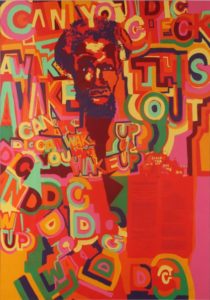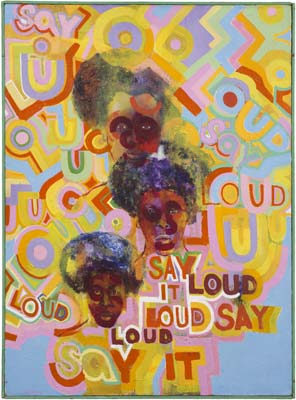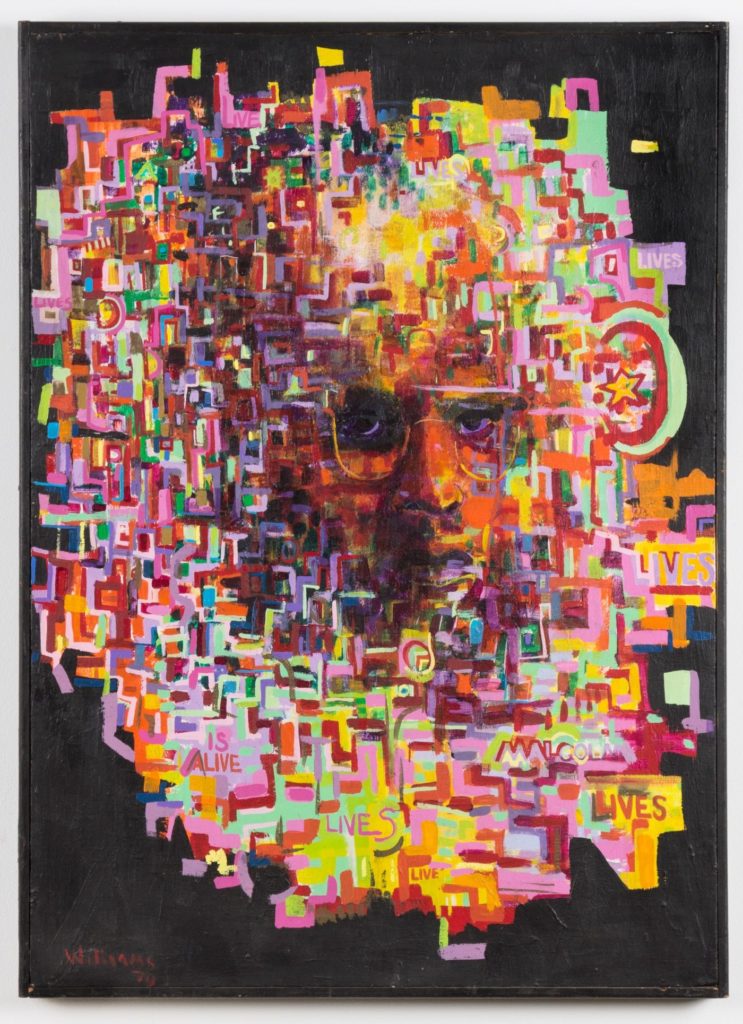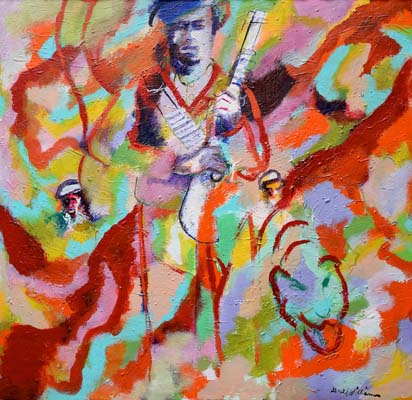
Gerald Williams, AfriCOBRA co-founder
Now in: The Time Is Now! Art Worlds of Chicago’s South Side, 1960–1980
Until December 30, 2018, Smart Museum of Art, Chicago
Wake Up, 1970
About:
Chicago was the birthplace of one of the most distinctive and influential art movements of the 20th Century. AfriCOBRA emerged out of the inquisitions of a small group of black artists into the nature of how best to express the aesthetics of culture, time and place. In a series of landmark exhibitions ending in the late 1970s, these artists presented a dynamic, celebratory vision of transnational Africanism, which, as described in the 1969 AfriCOBRA Manifesto, encompassed “Definition: Images that deal with the past; Identification: images that relate to the present; and Direction: images that look to the future.”

Say It Loud, 1969
Gerald Williams met fellow AfriCOBRA co-founders Jeff Donaldson (1932-2004) and Wadsworth Jarrell (b. 1929) in 1967. Williams worked with Donaldson at Northeastern Illinois University, and rented workspace next to Jarrell’s studio in the carriage house of a home on Chicago’s south side. The three began meeting with a few other artists for weekly get togethers to talk about aesthetics. Those casual gatherings became the genesis of the first transnational black art movement.
AfriCOBRA is now again coming sharply into view. Several of Williams’ iconic AfriCOBRA paintings were recently included in AFRICOBRA in Chicago, a multi-venue collaboration between The South Side Community Art Center, the Reva and David Logan Center for the Arts and The DuSable Museum of African American History, as well as in the monumental 2017 Tate Modern exhibition Soul of a Nation: Art in the Age of Black Power. But AfriCOBRA is only the beginning of Gerald Williams’ story.

Malcolm, 1970
In the decades following the last, unified AfriCOBRA exhibition, Williams traveled the globe working as an artist, a teacher, a Peace Corps volunteer, and an arts administrator for the United States Air Force. While studying, living and working in Kenya, Nigeria, South Korea, Japan, Italy, the Azores, as well as throughout the United States (Chicago, San Antonio, Tacoma, Sumpter and Washington D.C.) he has broadened his artistic practice, formulating a mature aesthetic position with universal resonance.
The confident vision Williams presents has grown out of a lifelong exploration of what he calls “mimesis at mid-point.” To mime does not mean to copy precisely, but rather to express the essence of something in a universally meaningful way. The mid-point to which Williams refers is a fluid arena of expression bridging the extremes of representation and abstraction, specificity and openness. His paintings, drawings, collages and constructions convey a vision of harmonies informed simultaneously by contemporary urban symbology, indigenous traditions, personal narrative, and global perspective. Williams’ work is polyrhythmic, layered, and multi-faceted; flowing between expressive, gestural freedom and meticulous control.

Meaningful Dialogue, 1969
Taking a retrospective viewpoint, Gerald Williams at Kavi Gupta offers an unprecedented opportunity to examine the evolution of William’s diverse oeuvre. On view are many never before exhibited works, including watershed pieces from the AfriCOBRA period, as well as works reflective of the epiphany Williams had when first visiting Africa for Festac ’77, the Second World Black and African Festival of Arts and Culture, plus multi-media pieces created throughout the 1980s, 90s and early 2000s during the artist’s time in Asia and Europe, along with select contemporary works.(text Kavi Gupta Gallery)
Gerald Williams currently lives and works in the West Woodlawn neighborhood of south Chicago, where he grew up, and to which he returned in 2015. In addition to its recent inclusion in Soul of a Nation: Art in the Age of Black Power at the Tate Modern, his work has been included in numerous national and international exhibitions and is part of private and institutional collections, including the Smart Museum of Art at the University of Chicago, the DuSable Museum of African American History, the Johnson Publishing Company
(publishers of Ebony and Jet) and the Brooklyn Museum.
